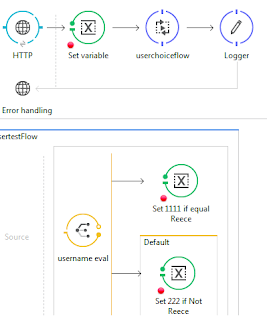working with messages in mule
When using mule, it is very common to set and access variables, sessions variable and property along our flow. What are the differences between :-
a) variable - data that exist and last from start to end of a flow unless over-written. Accessed using #[flowVars]
c) session - a lasting location for storing values. Accessed by using #[sessionVars]
d) property - are message header information
e) message payload - is the mule message sent to user and move from flow to flow. It could made up of message inflow (accessed using #[message.inboundProperties] and message outflow #[message.outboundProperties].
f) message events
The best way to test this out is to create a flow that makes use of these basic mule construct.
Let's start off with variable. From the flow below we grab input from http and save it to a variable. Then we create a choice flow to see if the variable is "reece". If yes, branch up and set result to 111, else 222.
If we have a look at the "set variable" we obtain value from http
And finally for the choice,
Once we have all these component wired up, just run http://localhost:3001/?username=reece,
This article purpose is to show you how to work with variables / messages in a mule flow. Understanding how to get the value and performing if/then/else construct is key.




Comments
Mulesoft Self Learning
Mulesoft Online Training in India